Home » Units & Services » Operational Services
Brevard County’s extensive coastline, inland waterways, canals and lakes present unique challenges for law enforcement and emergency rescue operations. The responsibility to meet these challenges falls to the Brevard County Sheriff’s Office Agricultural and Marine Unit.
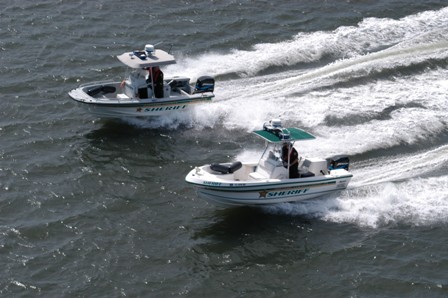 Using specialized equipment such as V-hull vessels, airboats, 4×4 trucks and all-terrain vehicles the Unit enforces marine laws and ordinances, responds to calls for service, investigates boating accidents and conducts boating education and safety inspections. The Unit works in conjunction with other state and federal entities on homeland security issues and with the interdiction of illegal activities such as narcotics and refugees. Additionally, the Ag/Marine Unit works closely with local farms and ranches to help keep the county’s natural resources well preserved for future generations.
Using specialized equipment such as V-hull vessels, airboats, 4×4 trucks and all-terrain vehicles the Unit enforces marine laws and ordinances, responds to calls for service, investigates boating accidents and conducts boating education and safety inspections. The Unit works in conjunction with other state and federal entities on homeland security issues and with the interdiction of illegal activities such as narcotics and refugees. Additionally, the Ag/Marine Unit works closely with local farms and ranches to help keep the county’s natural resources well preserved for future generations.
As active outdoor enthusiasts and resource enforcement deputies we are aware of the vast amount of information needed to stay legal and safe in your outdoor activities. We have encompassed a large amount of information that we feel will assist you in your goal to be a safe, and skilled outdoor steward utilizing Brevard Counties spectacular natural resources.
The State of Florida ranks first in the nation in number of boating accidents. The Brevard County Sheriff’s Office would like to offer these tips to help you avoid trouble while afloat:
The Ag/Marine Unit may attend Homeowner Association meetings when they relate to waterway issues and concerns and also participates in the county’s Marine Advisory Council Board.
For more information call 321-454-6643.
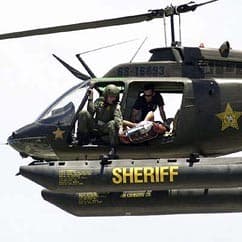 Brevard County, Florida is located in east central Florida. The county is one thousand five hundred and fifty seven square miles, twenty-two miles wide and seventy-two miles long. Land area is one thousand eighteen square miles, and the water within Brevard is five hundred thirty nine square miles. The entire eastern boundary of the county borders the Atlantic Ocean, making up seventy-two miles of beaches. Brevard County has sixteen municipalities with a population over 580,000. Brevard County is known as the “Space Coast” since it’s the home of the Kennedy Space Center and Cape Canaveral Air Force Station. Brevard County is home to Port Canaveral, one of the busiest freight and cruise ship port terminals in the country, as well as a Navy Trident turning basin for Ballistic Missile Submarines. Patrick Air Force Base and the Naval Ordnance Test Unit is also located within the county.
Brevard County, Florida is located in east central Florida. The county is one thousand five hundred and fifty seven square miles, twenty-two miles wide and seventy-two miles long. Land area is one thousand eighteen square miles, and the water within Brevard is five hundred thirty nine square miles. The entire eastern boundary of the county borders the Atlantic Ocean, making up seventy-two miles of beaches. Brevard County has sixteen municipalities with a population over 580,000. Brevard County is known as the “Space Coast” since it’s the home of the Kennedy Space Center and Cape Canaveral Air Force Station. Brevard County is home to Port Canaveral, one of the busiest freight and cruise ship port terminals in the country, as well as a Navy Trident turning basin for Ballistic Missile Submarines. Patrick Air Force Base and the Naval Ordnance Test Unit is also located within the county.
Prior to 1996, the Brevard County Sheriff’s Office operated a part time Aviation Unit, utilizing a Hughes 269 helicopter, and then a Robinson R22 helicopter. The Sheriff’s Office also operated several fixed wing aircraft prior to 1996, one of which was a Baron that was seized during a narcotics investigation. During this time, the unit was strictly an “on-call” unit only. When the helicopter or fixed wing was needed, a pilot would be called to respond from their other duties that they were assigned. The aircraft were stored at Space Coast Regional Airport in Titusville, which is at the north end of the county.
In 1996, the Sheriff’s Office received four flyable OH-58A+ helicopters under the 1208 program. Three of the aircraft were outfitted as patrol aircraft and the fourth was utilized as the training aircraft. The Baron was sold during this time so the first Forward Looking Infrared (FLIR 6000) System, could be purchased.
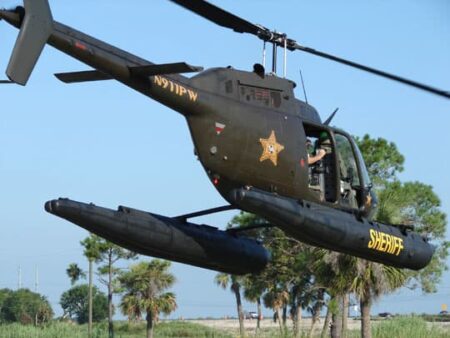 In 1997, the Aviation Unit was in place on a full time basis and moved to the Merritt Island Airport, which is located in the center of the county. The Aviation Unit worked with three full time pilots, a mechanic/pilot, and five FLIR operators dually assigned, working other duties within the Sheriff’s Office, as well as within the Aviation Unit.
In 1997, the Aviation Unit was in place on a full time basis and moved to the Merritt Island Airport, which is located in the center of the county. The Aviation Unit worked with three full time pilots, a mechanic/pilot, and five FLIR operators dually assigned, working other duties within the Sheriff’s Office, as well as within the Aviation Unit.
Since becoming a full time operation, the Aviation Unit known as “STAR” (Sheriff’s Tactical Air Response) responds to a multitude of calls such as, crimes in progress, search and rescue missions, and performing counter drug surveillance. STAR also plays an instrumental part supporting other emergencies such as brush fires and hurricane damage reconnaissance flights. In 2000, the Aviation Unit started utilizing two sets of ANVIS-9 Night Vision Goggles. The Aviation Unit also began utilizing officers from cities within Brevard County. In 2001, the Aviation Unit received its second Forward Looking Infrared (FLIR 7500) System. After receiving this system, the Aviation Unit placed second in the FLIR Vision Award at the Airborne Law Enforcement Association (ALEA) annual conference in Austin, Texas.
After the September 11th terrorist attacks, the duties of the Aviation Unit grew, requiring increased security at Port Canaveral during the time cruse ships were entering and exiting the port. The STAR Unit also assisted with the Temporary Flight Restrictions (TFR) during Space Shuttle launches, as well as several Presidential visits. If there was an aircraft violating the air space, it is the military fighter’s job to gain attention of the pilots, notifying them of the violation. The Aviation Unit then escorted the aircraft to airports within the county, standing by until an investigator arrived on scene.
In 2002, the first full time Tactical Flight Officer / FLIR operator was assigned to the Aviation Unit. This has greatly improved the performance of the Aviation Unit. In July 2003, the unit was awarded first place in the FLIR Vision Award at ALEA’s annual conference in Wichita, Kansas.
The Aviation Unit participates in the Project Lifesaver program, which utilizes electronic wristbands, emitting a frequency that can be tracked to help locate those who have Alzheimer’s, Dementia or subjects that wander from their familiar surroundings and become lost. These units have had great success locating children diagnosed with autism or Down’s syndrome.
In April 2004, the Aviation Unit acquisitioned a set of fixed floats that attached to the training aircraft. The need for this type of aircraft was necessary because of the increased number of water related calls that the STAR aircraft were responding to, but unable to offer any “hands-on” support.
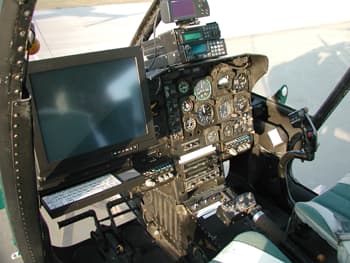 After the installation of the floats, the Aviation Unit was afforded the opportunity to train on crew deployment into water with Patrick Air Force Base’s 920th Rescue Squadron. The Aviation Unit was also trained in basic water life saving techniques with Brevard County Fire Rescue’s Ocean Life Guard Unit.
After the installation of the floats, the Aviation Unit was afforded the opportunity to train on crew deployment into water with Patrick Air Force Base’s 920th Rescue Squadron. The Aviation Unit was also trained in basic water life saving techniques with Brevard County Fire Rescue’s Ocean Life Guard Unit.
Within three months of the floats being installed onto the aircraft, “STAR FISH”, had its first water rescue. At the entrance to the St. Johns River on Lake Washington, two airboats collided, partially submerging both of them in the water, out of reach of any aid via land. Several people were injured, one critically. STAR FISH was called upon to respond and landed on Lake Washington. With the assistance of Brevard County Fire Rescue, the most critical patient was loaded into the aircraft and transported to a landing zone, where they transferred to a waiting air ambulance and flown to the trauma center in Melbourne. Because of the types of calls STAR FISH is responding to, the Aviation Unit has begun training paramedics with Brevard County Fire Rescue Station 43, which is also located at the Merritt Island Airport. The paramedics are versed on how to respond, work on, and operate around and in the float aircraft. This type of training ensures future responses of STAR FISH will have dedicated paramedics trained to respond with the Aviation Unit.
In September 2005, the Aviation Unit added a fourth full time pilot to the unit.In July 2006, the unit was awarded second place in the FLIR Vision Award at ALEA’s annual conference in New Orleans, Louisiana. In December a second full time mechanic was added to the unit.
In July 2007, the unit was awarded third place in the FLIR Vision Award at ALEA’s annual conference in Orlando, Florida and in October a second full time Tactical Flight Officer / FLIR operator was assigned to the Aviation Unit.
In 2009, the unit was awarded second place in the FLIR Vision Award at ALEA’s annual conference in Savannah, Georgia. During this year we completed the construction of new offices, maintenance shop and parts room in the hangar.
In 2015 we received a flyable UH1H helicopter from the Department Of Defense 1033 program at a cost of 2,000.00. The aircraft is used for search and rescue/fire fighting operations. A fire medic supplied by BCFR is placed on board during search and rescue missions to provide immediate medical assistance. At approximately the same time we received over two million dollars in parts from the GSA program to support the UH1H. Cost for the parts was approximately 4,000.00.
The Aviation Unit trains bi-annually in Water Survival Techniques. Since 1998 the Brevard County Sheriff’s Office has utilized Lunsford Air Consulting, Inc. for all of their flight training. This includes semi-annual recurring emergency day and night procedures, as well as Night Vision Goggle training.
In Mid 2021, we replaced our ageing “FLIR” camera systems with the top of the line FLIR Star SAPHIRE 380-HD system combined with a Shot Over mapping system. The combination of these two systems greatly enhances the ability of the Sheriff’s Office air crew to assist in searches of criminals and missing/endangered people due to the superior quality of the image provided. In addition, this system also allows the air crew to provide pin point accurate location information to deputies on the ground.
Yearly, the aviation unit currently assists with approximately six to seven hundred calls for service while flying approximately 450 to 550 hours. We operate seven days a week 23 to 24 hours a day with a yearly operational budget of $154,937.00.
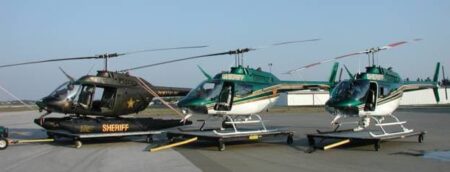
You may contact our Aviation Unit at 321-454-6643.
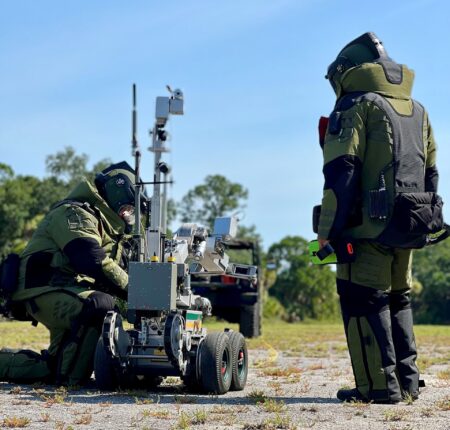 The Brevard County Sheriff’s Office Bomb Squad was established in 1988 with two original certified bomb technicians, J.R. Hansen and Jack Aguiar. Since its inception, the unit has grown to include multiple certified technicians who specialize in various disciplines including explosive breaching, render-safe procedures, and advanced robotic operations. The Bomb Squad has maintained continuous federal accreditation through the Federal Bureau of Investigation (FBI) and remains committed to the highest standards of training and readiness.
The Brevard County Sheriff’s Office Bomb Squad was established in 1988 with two original certified bomb technicians, J.R. Hansen and Jack Aguiar. Since its inception, the unit has grown to include multiple certified technicians who specialize in various disciplines including explosive breaching, render-safe procedures, and advanced robotic operations. The Bomb Squad has maintained continuous federal accreditation through the Federal Bureau of Investigation (FBI) and remains committed to the highest standards of training and readiness.
The unit is tasked with responding to and mitigating improvised explosive devices (IEDs), conducting post-blast investigations, supporting SWAT operations, and working in close coordination with Explosive Detection K-9 teams. The Bomb Squad plays a critical role in ensuring the safety and security of Brevard County and the surrounding region.
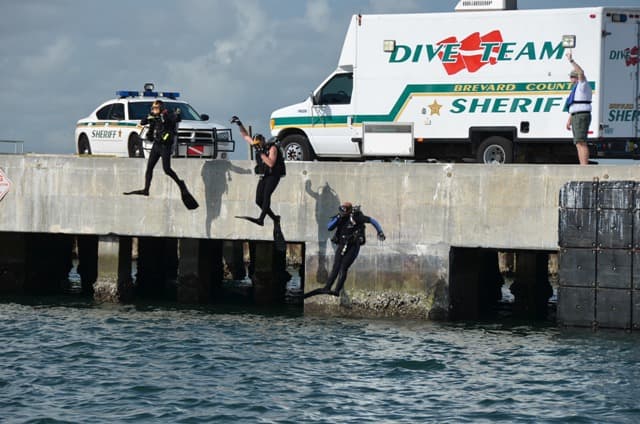 Brevard County has 75 miles of the Atlantic Ocean bordering its east coast, the St. John’s River providing the west border, the Indian River and Banana Rivers both running nearly the entire length of the county, vast numbers of canals, lakes and ponds, and also boasts Port Canaveral, the busiest cruise port in the Western Hemisphere.
Brevard County has 75 miles of the Atlantic Ocean bordering its east coast, the St. John’s River providing the west border, the Indian River and Banana Rivers both running nearly the entire length of the county, vast numbers of canals, lakes and ponds, and also boasts Port Canaveral, the busiest cruise port in the Western Hemisphere.
With the vast amount of water areas and the waterborne activity that comes with it, it isn’t difficult to see why the Brevard County Sheriff’s Office Dive Team stays so busy.
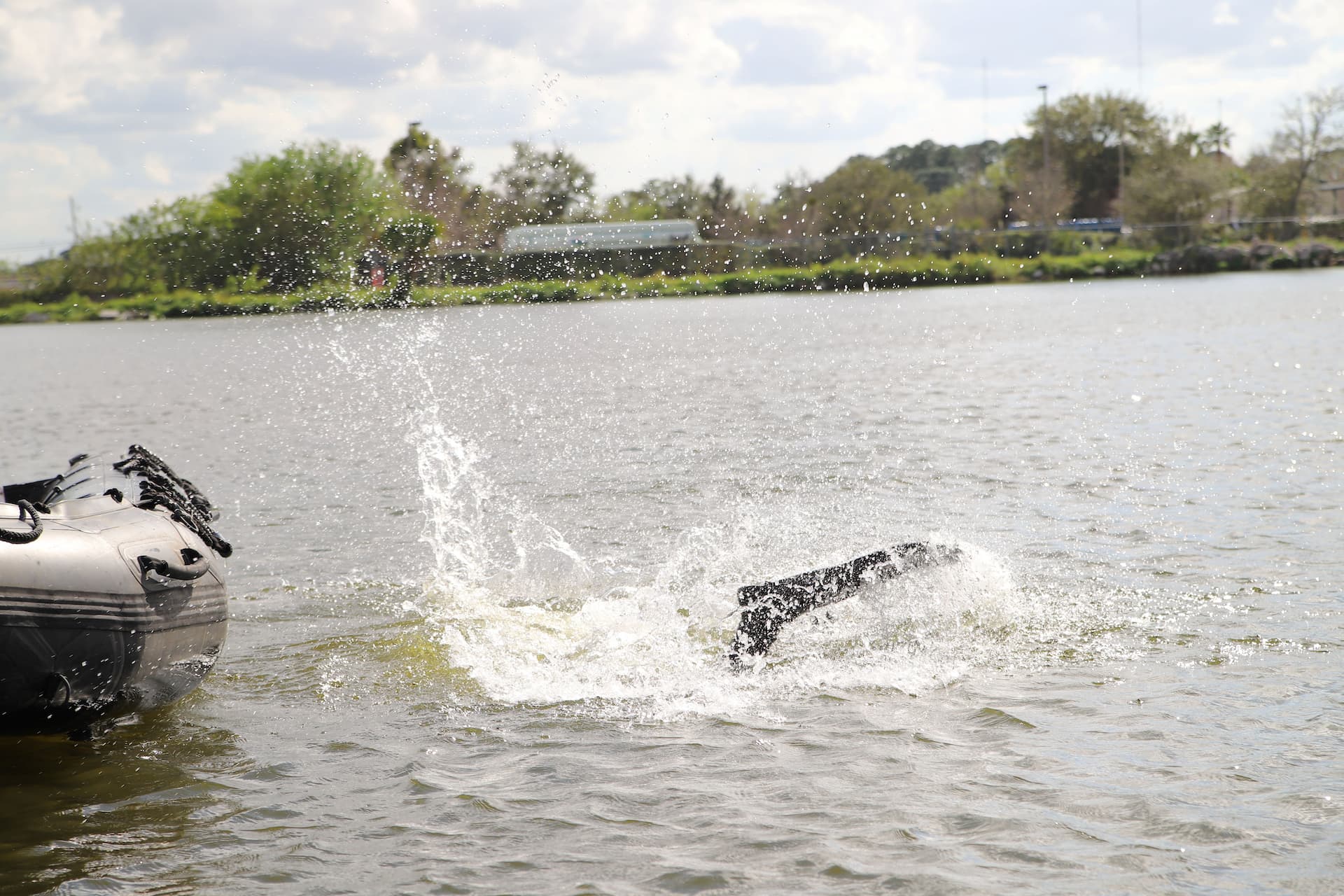
Thirteen members representing a diverse cross section of the different units within the Sheriff’s Office currently man the Dive Team. Members are on call 24 hours a day, seven days a week in addition to their primary duties of court services, road patrol, corrections, traffic enforcement, ag/marine and crime investigations.
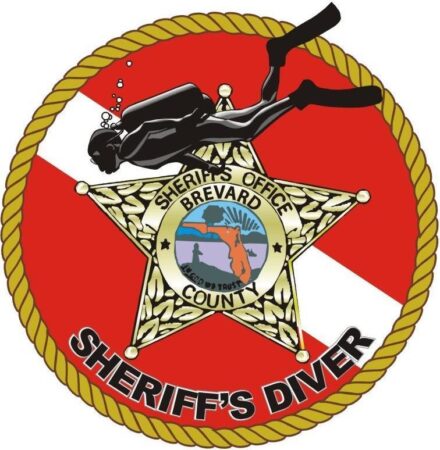 The Dive Team handles all underwater investigations for the Sheriff’s Office including evidence recovery, body recovery, vehicle recovery and any other duties requiring specialized in-water response. The Dive Team is also called upon frequently by the United States Customs Office and the United States Coast Guard to perform diving operations relating to drug interdiction, (hull searches), and port security within Port Canaveral. Over the past few years, the Dive Team has averaged over 30 call-outs a year.
The Dive Team handles all underwater investigations for the Sheriff’s Office including evidence recovery, body recovery, vehicle recovery and any other duties requiring specialized in-water response. The Dive Team is also called upon frequently by the United States Customs Office and the United States Coast Guard to perform diving operations relating to drug interdiction, (hull searches), and port security within Port Canaveral. Over the past few years, the Dive Team has averaged over 30 call-outs a year.
While the Dive Team has been very successful in competing in the Annual Public Safety Diver’s National Forum held in Orlando, it is most proud of its outstanding record of providing a professional Public Safety dive team for the agencies throughout this area and the citizens of Brevard County.
For more information contact: Lt. Brett Lockhart at 321-868-1113.
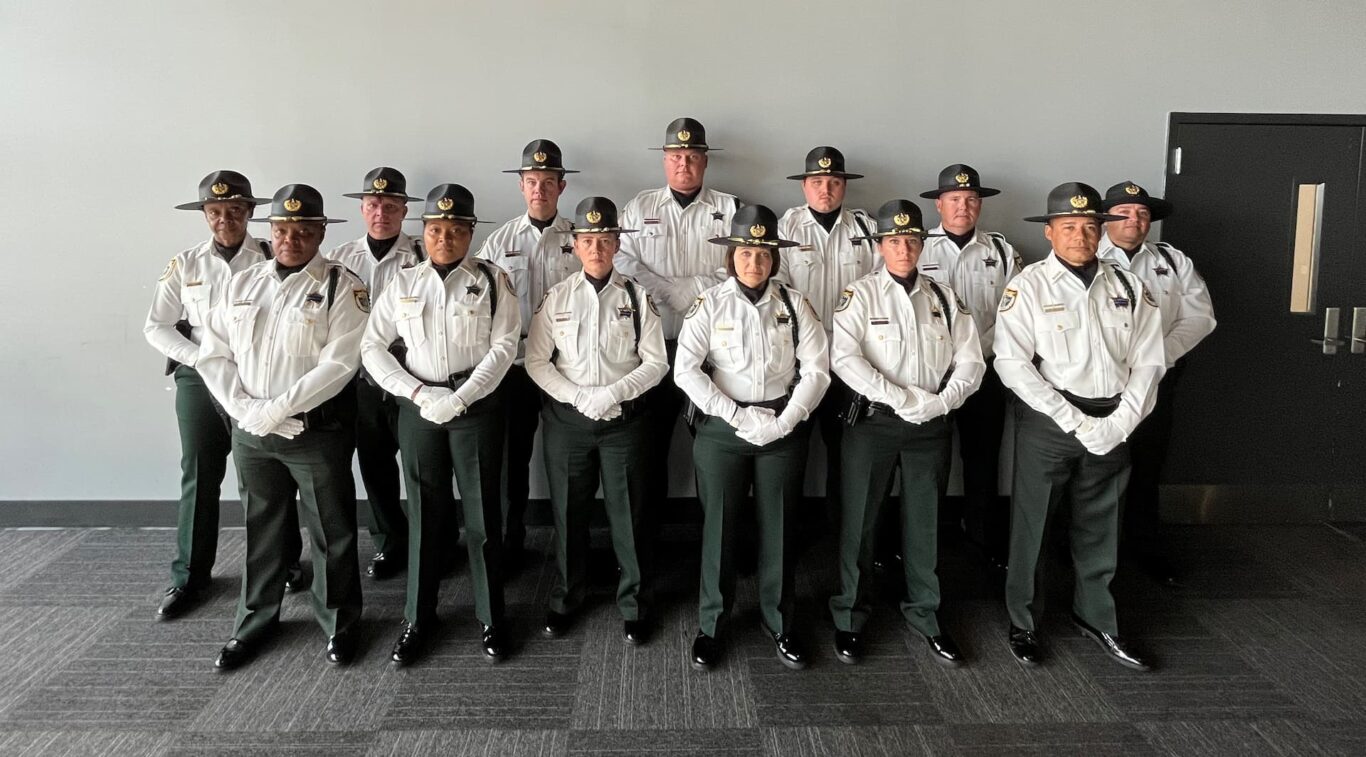
Honor Guard Mission: Represent the high degree of honor, dignity, and professionalism of the Brevard County Sheriff’s Office.
The Honor Guard has been established to represent the Sheriff’s Office at Law Enforcement funerals, parades and other ceremonial occasions. The Honor Guard has the added distinction of honoring employees when they have made the ultimate sacrifice and have died “in the line of duty”.
“Let no officer who dies for our freedom be forgotten.”
For more information call 321-454-6643.
At the Brevard County Sheriff’s Office, like most other large law enforcement agencies in the world, K-9 Units are an essential tool in the fight against crime. A canine’s superior sense of smell allows them to not only detect minuscule odors undetectable by their human law enforcement counterparts, but to distinguish these odors from an array of distracting and/or more powerful odors. Their keen eyesight, used in the wild to detect prey, supplements this sense of smell to make them unmatched locating tools. Canines are not only intelligent and trainable, but they adapt well to new and changing situations, a constant in the unpredictable world of law enforcement.
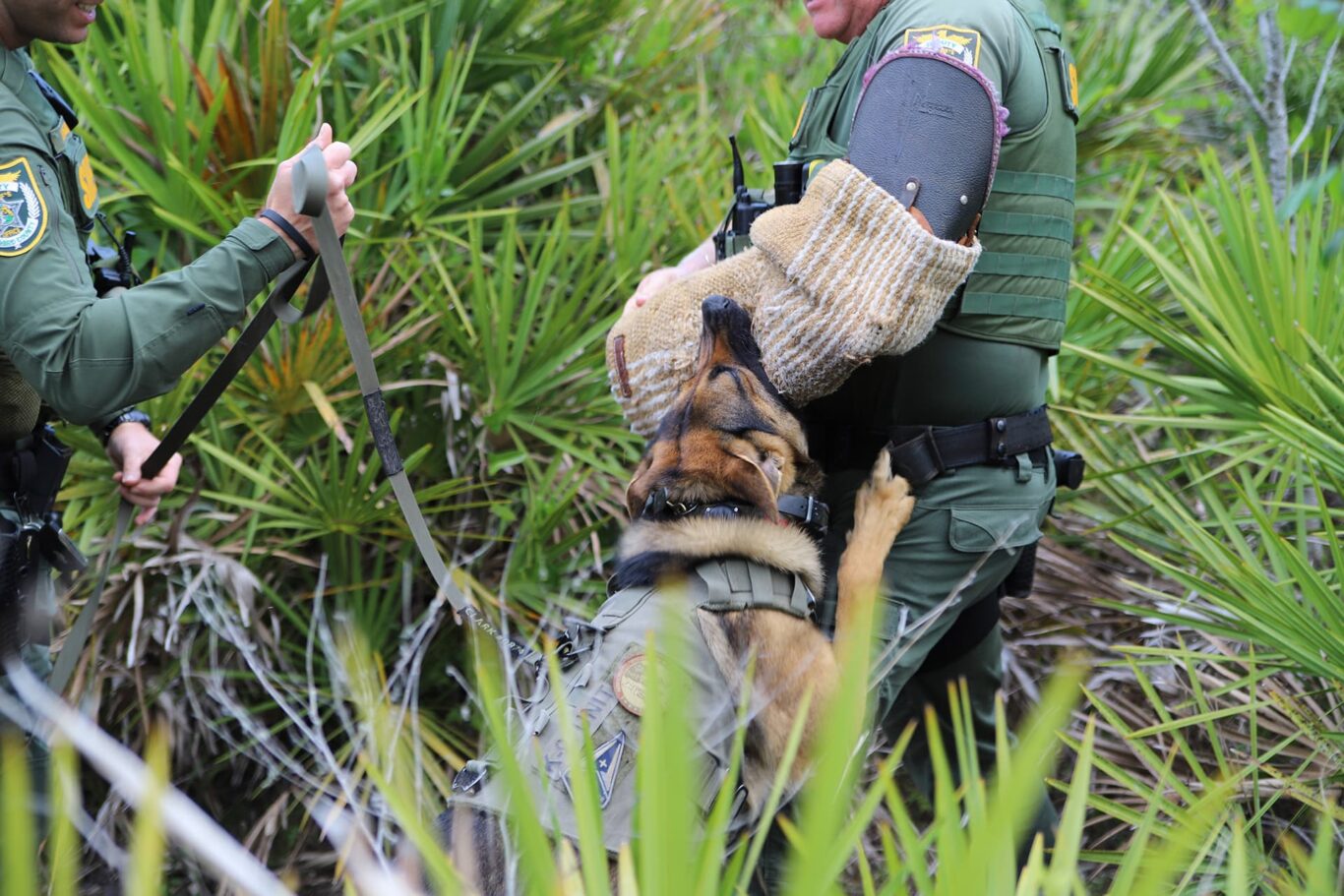
Humans have recognized the benefits of using canines in law enforcement dating back to Ancient Egypt. In New York and other American cities of the 1800’s, officers who walked their beats carrying only batons were no match for criminals armed with knives and pistols. To reduce the high rate of on-duty officer injuries and deaths, U.S. municipal police agencies began to pair up specially trained officers with canines.
In 1997, the Brevard County Sheriff’s Office re-established the K-9 unit, which only consisted of four K9 teams. The K-9 Unit has now expanded to seventeen K-9 teams that are individually assigned to different precincts throughout Brevard County.
These K-9 teams are composed of a handler assigned to a specific canine partner. Currently, the Brevard County Sheriff’s Office utilizes canines of several common working breeds. Three Labrador Retrievers are utilized as single purpose explosive detection canines, although they are also cross-trained in tracking to utilize for missing person tracks. The thirteen remaining K-9 teams utilize German Shepherds, Dutch Shepherds, and Belgian Malinois, which are dual-purpose patrol and narcotics detection canines.
K-9 teams are currently assigned to different precincts, and are mainly utilized to support uniform road patrol deputies. When the K-9 deputies are not using their canine partners, they assist with the various calls for service in their precinct. In 2008, the K-9 teams assisted the road deputies with 1038 drug sniffs on vehicles, resulting in 183 arrests for drug related charges. The K-9 teams also assisted the patrol deputies during other investigations by conducting building searches (158), area searches (20), and tracks for lost persons or criminal subjects (126). The K-9 teams also assists other law enforcement agencies when they request K-9 support. In 2008, the K9 Unit assisted a variety of municipal, state, and federal agencies on 144 occasions.
Police dog candidates often come from proven bloodlines with a documented lineage of quality working offspring. German Shepherds are a common choice of breeds because of their superior intelligence, versatility, stability, energy, strength and adaptability, although other breeds have proven their ability to be an excellent K-9 candidate.
Selecting a working canine from these proven bloodlines can still be a daunting task. There are certain characteristics that are necessary for a good police dog; they include temperament, courage, endurance, sharpness, and instinctive drive. Most police dog candidates have these positive traits to some degree, but not all dogs exhibit the proper balance required of a good working canine. Testing the candidates can show us how each of their characteristics manifest themselves in certain scenarios, thus allowing us to pick the better dogs. This series of tests is designed to gauge the dogs base level of performance in each of these traits.
Once a dog is chosen as a BCSO K-9 trainee, it will go through a Florida Department of Law Enforcement approved Patrol K-9 training course. The K9 Patrol Training Course consist of 400 hours of training, which covers obedience, man work (physical apprehension), recalls, tracking, building searches and agility training. Once a canine completes the patrol training course, the handler and his K-9 still have to be certified by two FDLE approved evaluators. After the K-9 team passes certification, they will go through additional training in narcotics or explosives detection.
After the K-9 team passes their certification(s), the training does not stop.Continuous maintenance training must be conducted or the canines will lose proficiency in their trained tasks. Every Wednesday, all K-9 teams meet to stay proficient by providing new training challenges to both the K-9 handler and canine partner. This training will cover basic obedience, building searches, area searches, bite work and drug searches; but also allow trainers to cover unique scenarios encountered by other K-9 Teams on actual calls or advanced tactical training and deployment with other specialty units such as SWAT, Ag/Marine, and FWC.
The Brevard County Sheriff’s Office has received several generous donations from local residents and businesses, which offsets the cost of purchasing a new canine. Monetary donations are not the only way local businesses support the K-9 Unit. Braden Kitchens generously gave the K-9 Unit access to their building so we can train the canine in building searches. The K-9 Unit is always actively looking for new areas and buildings to train in. This support provides a “win” for all involved by providing a law enforcement presence to businesses during training, and new opportunities for K-9 Teams to train in realistic environments.
Once a canine is purchased, he/she stays at the handler’s home. A fully enclosed 6’ x 10’ kennel is built at each handler’s residence to house the canine during off-duty hours. These kennels provide a sheltered, sanitary, and safe environment for the canine. Oftentimes they include a personal touch for the canine such as a doghouse, elevated sleeping platform, fans, etc.A handler also has the option of allowing their K-9 partner to live in their residence alongside their family and other pets.
The K-9 Unit also performs demonstrations throughout the year. The K-9 handlers use these demonstrations to show how their trained dogs listen to them in obedience; how they apprehend criminal suspects and release on command; how they can find lost items or articles in high grass; and how they alert on hidden drugs. In 2008, the K-9 Unit performed over 100 demonstrations.In 2009, the K-9 unit is on course to conduct 100 demonstrations or more. These demonstrations also serve as an opportunity for the handlers to show how our canines can interact socially with all citizens, young and old alike, in a friendly manner. Any local business, organized groups, or private citizens may request a K9 demonstration. To make a request for a demonstration, contact the BCSO Special Operations Division.
Though the dog is a significant part of a K-9 team, the handler is extremely important. These deputies are special men and women. Each is professional and self-disciplined. Deputies that handle Patrol K-9s must have very good judgment, as their roll as a K-9 Handler will place them in a higher percentage of critical and dangerous situations, such as lethal force standoffs. All handlers must be dog lovers and have a natural ability to communicate with his or her K-9 partner.
A BCSO K-9 reaches the age of retirement usually around 7 or 8 years old, or when it can no longer physically endure the stresses of the job. After retirement, they are usually adopted by their handlers and live out their retirement interacting with their family.
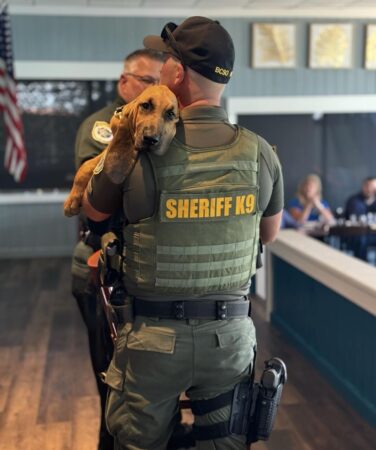 The Jail Complex is home to Bloodhounds that have been trained for tracking wanted persons and searching for missing persons. These dogs live in a kennel on the Jail grounds and are teamed up with Corrections Deputy handler. All the teams are members of the FDLE Child Abduction Response Team and the National Center for Missing and Exploited Children’s Team Adam. In addition to the Bloodhounds, the Jail also has a German Shepard trained for narcotic detection.
The Jail Complex is home to Bloodhounds that have been trained for tracking wanted persons and searching for missing persons. These dogs live in a kennel on the Jail grounds and are teamed up with Corrections Deputy handler. All the teams are members of the FDLE Child Abduction Response Team and the National Center for Missing and Exploited Children’s Team Adam. In addition to the Bloodhounds, the Jail also has a German Shepard trained for narcotic detection.
BCSO is proud to have a cadaver dog as part of the team. Canine Sherlock holds certifications through the International Police Working Dog Association, Tennessee Search and Rescue Dog Association, and has a National Center for Missing and Exploited Children / FBI Cadaver Certification. Sherlock has been called to duty many times and has also assisted in disasters outside of Brevard County.
For more information call 321-454-6643.
The Traffic Unit has the primary responsibility for Traffic and D.U.I. Enforcement throughout the entire county. They also conduct Special Details such as parades, several types of traffic escorts, traffic control, and civic benefits, etc. This unit’s goal is to reduce the traffic fatalities on Brevard County Roadways and Interstate with aggressive traffic enforcement.
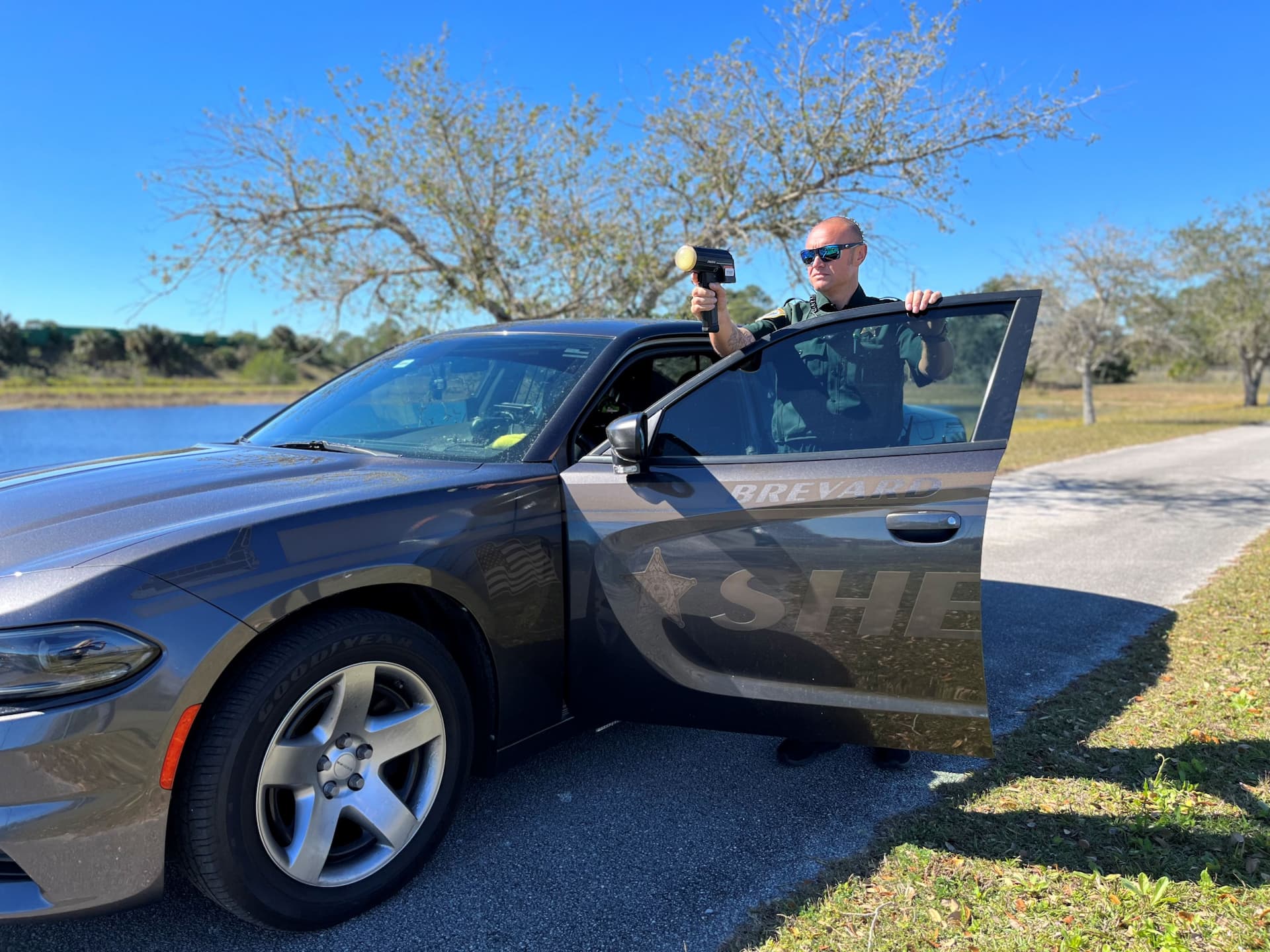
The number one complaint the Sheriff’s Office receives from citizens is that we need to write more traffic tickets. The number two complaint is that we write too many tickets. Each year, Brevard County Sheriff’s Office issues thousands of citations and warnings to drivers not to raise money for the Sheriff’s Office, but solely to protect the citizens and visitors who are using our roadways. It is the duty of each Deputy Sheriff to enforce posted speed limits and the traffic laws and we are committed to do our duty to the highest level possible.
Sheriff’s Deputies do not have quotas for traffic citations, and we fully support our Deputy’s decision to give warnings in lieu of citations at their discretion depending on the circumstances. It is also a common misconception that the Sheriff’s Office receives all of the money from traffic fines. The great majority of the money collected goes to the State of Florida.
Only a small portion (about 4 dollars) is put in a State fund for training law enforcement personnel.
The lion’s share of the money collected goes to the State of Florida. As a result, we do not write tickets for the money. We write tickets to enforce the law and most importantly, to save lives.
We want our citizens to know that we are absolutely committed to their safety and we will continue to do everything within our power to ensure Brevard County roadways are as safe as possible.
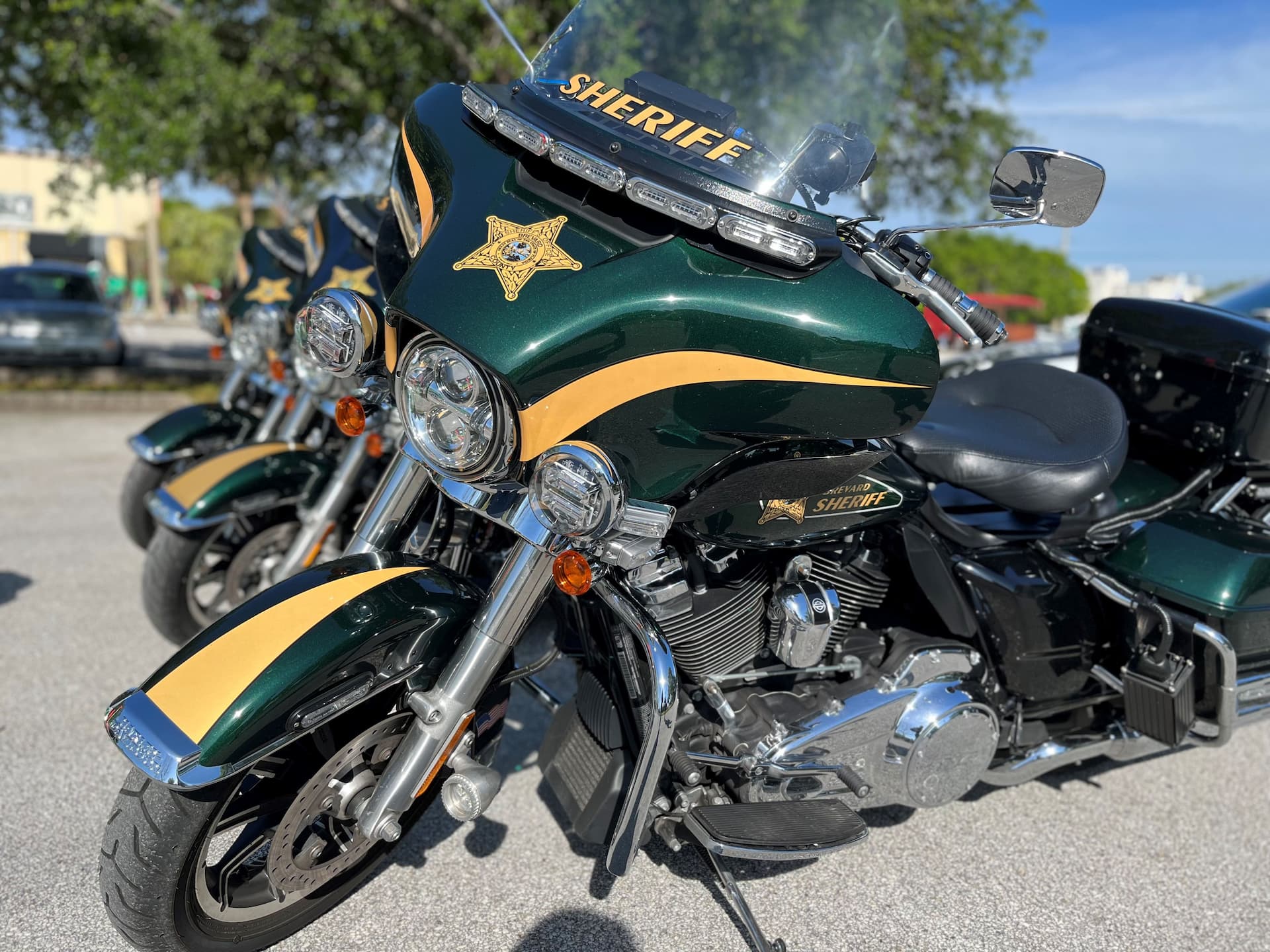
For more information call 321-454-6643.